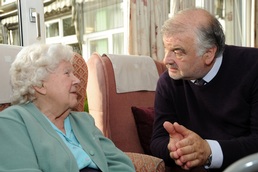National diabetes care home survey highlights 'concerning' results
Nearly one in five care home residents with diabetes self-medicate without any checks, according to new research.
Self-management is usually encouraged, but vulnerable people with diabetes, especially those on the potentially-dangerous drug insulin, should be checked to ensure they have taken their medicine to prevent complications, including descending into a coma, according to the Institute of Diabetes for Older People.
The first ever National Care Home Diabetes Audit also revealed that more than 60 per cent of the 2,043 premises surveyed did not have a designated member of staff with responsibility for diabetes management.
The audit was carried out by the Institute of Diabetes for Older People (IDOP) in partnership with ABCD (Association of British Clinical Diabetologists) and a group of other key collaborators. The audit results found only one in 10 care home residents were reported as having diabetes although this figure is at odds with previous research that showed as many as 1 in 4 of all care home residents actually have diabetes.
However, despite this high number, 63.2 per cent of homes did not have a designated member of staff with responsibility for diabetes management. Also, nearly two thirds of care homes had no policy on screening for diabetes.
The audit seeks to identify quality standards that can be picked up by the Care Quality Commission (CQC) to be used for assessment of the quality of diabetes care being delivered in care home settings.
 Professor Alan Sinclair, audit lead and director of IDOP, said: “We undertook this research to firstly ascertain what areas of diabetes care within residential settings can be further supported and, secondly, to gain better insight into the difficulties of providing enhanced care in these rather complex settings.
Professor Alan Sinclair, audit lead and director of IDOP, said: “We undertook this research to firstly ascertain what areas of diabetes care within residential settings can be further supported and, secondly, to gain better insight into the difficulties of providing enhanced care in these rather complex settings.
“We know care home staff are working hard to care for their residents, but it was sad and concerning to discover some of the results. Especially, the fact that 17.3 per cent of homes had no system in place to examine whether those who self-medicate for diabetes have taken their medication. We encourage self-medication but it needs to be checked in a care setting, especially”.
He added: “However, this audit has the potential to improve care for older people with diabetes living in care homes in England, and give insight on how to provide staff with the training and support that they need, as well as assisting managers and policymakers to allocate resources.”
Peter Winocour, former chairman of ABCD, said: “We are very pleased to support this important work, which really must be seen as a call to action.”
The audit also found that more than a third of residents (35.17 per cent) did not know about the signs and symptoms of hypoglycaemia – a complication of diabetes, which can result in hospital admission due to a coma if left untreated. More than 35 per cent of care homes did not have a written policy for managing hypoglycaemia.
.
Latest News
 29-Jul-24
Dementia Bus gives carehome.co.uk staff insight into life with dementia
29-Jul-24
Dementia Bus gives carehome.co.uk staff insight into life with dementia
 01-Mar-24
Find out the top care homes in 2024
01-Mar-24
Find out the top care homes in 2024
 21-Mar-23
UK's top care homes in 2023 revealed
21-Mar-23
UK's top care homes in 2023 revealed
 03-Jan-23
carehome.co.uk launches free care helpline
03-Jan-23
carehome.co.uk launches free care helpline
 13-Dec-22
5 mins with Emily Whitehurst, chief operating officer for Constantia Healthcare
13-Dec-22
5 mins with Emily Whitehurst, chief operating officer for Constantia Healthcare